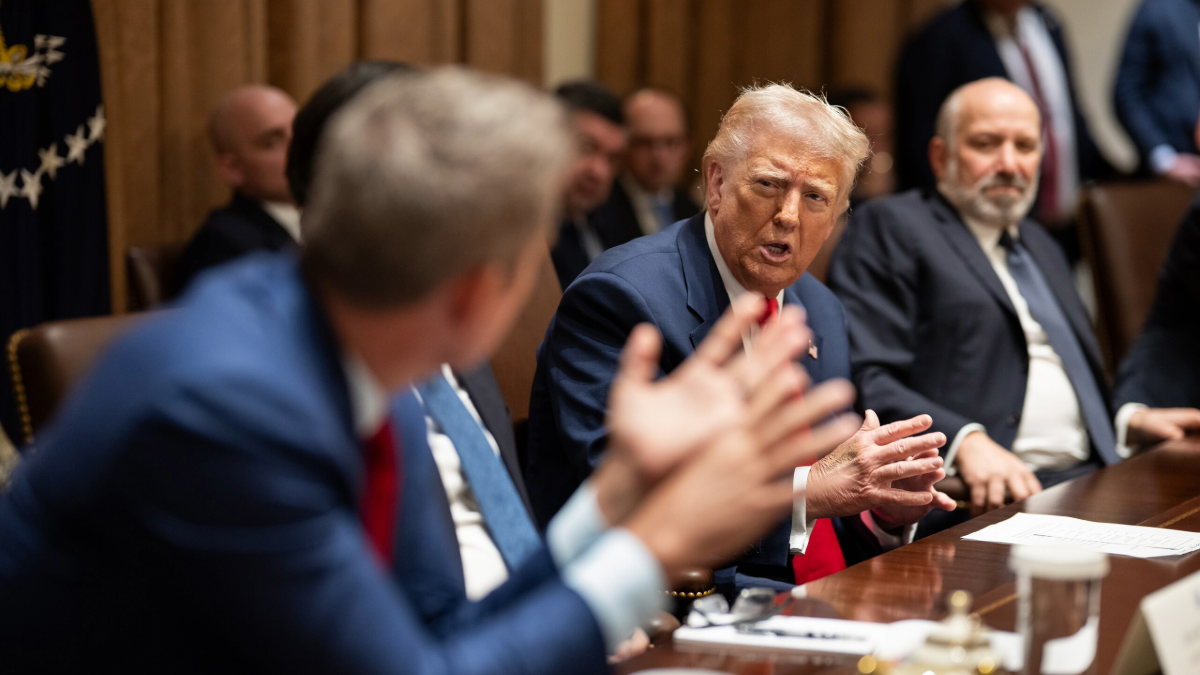Trump 2.0 and the Emergence of Tech Policy as a Tool in Global Realpolitik
Amber Sinha / Apr 30, 2025Amber Sinha is a contributing editor at Tech Policy Press.

Thursday, March 6, 2025—President Donald Trump meets with his cabinet in the White House. (Official White House Photo by Daniel Torok)
Meta's early 2025 announcements regarding alterations to its fact-checking and hate speech rules, affecting Facebook, Instagram, and WhatsApp, mark the culmination of a more than two-year trend of weakening trust and safety measures across major online platforms. These adjustments are all the more significant as they bookended a historic year in 2024, which saw elections take place in more than 60 nations. While the weakening of content moderation practices and resourcing was already a trend, the agility with which Meta reversed multiple, hard-fought practices—many of which it had previously touted as evidence of its commitment to preserving the integrity of elections and democracy—is a significant shift in the global technology policymaking playbook.
These changes are part of a larger transition in which digital policymaking, both by nation-states and companies, is now more openly a tool of realpolitik negotiation between these actors. This is in contrast to the last decade and a half, during which they were, at least ostensibly, a consequence of considerations aimed at protecting digital rights, digital markets, and the digital public sphere.
Using community guidelines as a means to gain favor with Trump and MAGA
Over the last decade and a half, as large American tech companies like Facebook, Google, Apple, X, Instagram and WhatsApp have grown to unprecedented scales, their response to illegal and harmful online speech and privacy issues posed by their products has been largely centered on self-regulation through platform policies and community guidelines, which the companies have claimed are based in internationally recognized human rights standards for regulation of privacy, data, content and speech. To begin with, these were grounded in American First and Fourth Amendment constitutional protections. Over time, a direct impact of the much-touted Brussels Effect was that more robust regulations, first on privacy and data protection, began to inform the default standards for these self-regulatory rules.
The US elections in 2016 and the exposure of Facebook's part in the violence in Myanmar in 2017 were key turning points for more focus on the need for greater speech regulation. These events spurred the development of a whole field of trust and safety professionals dedicated to working at and with big tech firms. This led to increased attention on two main areas: managing online content related to elections, and the rise of researchers, nonprofits, and funding initiatives focused on studying and lessening online risks. While the success of tech companies in addressing these issues varied significantly around the world, the 2019-20 election cycle did demonstrate some notable improvements in trust and safety, particularly in how online content was monitored.
This regulatory shift, particularly on online speech, was received with increased suspicion and distrust by the MAGA movement in the US, culminating in the deplatforming of outgoing President Trump in 2021 and a subsequent sustained campaign to battle tech “censorship.” From 2022 onwards, with the acquisition of X (formerly Twitter) by Elon Musk, we see the beginning of backsliding on the hard-fought gains in trust and safety. Meta’s changes in January 2025 represent both a capitulation to the MAGA movement and the end of an era of trust and safety. It demonstrates the agility with which Big Tech companies can shift their positions in response to geopolitical expediencies with an alarming degree of moral flexibility.
Tech regulations as a bargaining chip in trade wars
My colleague, Tech Policy Press contributing editor Mark Scott, wrote recently that “speculation rose that Brussels — bristling from deteriorating relations with its closest ally — would seek to target digital services from the likes of Meta, Alphabet and Amazon in its collective brinkmanship with Washington.”
The laws governing digital services in the EU—including the General Data Protection Regulation (GDPR) and more recent regulations such as the Digital Services Act (DSA), Digital Markets Act (DMA), and the AI Act—provide its regulatory apparatus a wide range of strong sanctions, penalties and restraints which it can employ against large digital platforms. Despite claims by US companies and even recent statements by leaders such as Vice President JD Vance to the contrary, these regulations have not been used in any significant way as tools of trade wars and negotiations, or as protectionist measures against foreign Big Tech. A big factor is also that the EU and the US have been long-standing allies and each other’s biggest trade partners. In fact, the EU has accommodated American interests through a succession of arrangements to facilitate the free cross-border flow of data, despite US data protection regulations being woefully short of its adequacy standards.
A new Trumpian world order threatens to upset this transatlantic bonhomie and creates new incentives for the EU to weaponize its technology regulations against US technology giants as a negotiating tactic. Whether the speculation mentioned above proves to be true will depend on a variety of factors, including Brussels' assessment of how persuasive its targeting of US technology companies will be in pushing a bullish Trump administration to rethink its aggressive positions. It is also worth noting that while all US Big Tech firms have taken steps to express allegiance to the Trump administration, aside from Musk’s X, there is so far little evidence to suggest that this loyalty will be rewarded. Regardless of how this plays out, it is impossible to deny that in a world order where the US openly champions self-interest and what ‘cards’ its supposed allies and adversaries hold, digital technology regulations will be an overt ‘card’ to be played in geopolitical battles.
How might tech oligarchs close to Trump exercise power in other countries?
I mentioned above that expressing fealty to the Trump administration may not necessarily translate into protection for US Big Tech companies. The continuing antitrust proceedings against Meta, in particular, showcase how even radical changes to policies to align with MAGA may not gain them immediate favors. The one tech oligarch, who clearly has administration in his corner, is Elon Musk. Let us consider what the last 100 days of the Trump administration tell us about the potential consequences of this alignment.
An obvious way in which Musk is conjoining himself with Trump seems to be playing out in the impact it has on how political actors outside of the US respond to him. In India, X recently challenged provisions of the Information Technology Act, which allowed the Indian government to enable a parallel content blocking regime. Before Musk’s takeover, Twitter and the Indian government had a long history of conflicts, which included summons to Twitter executives, threats of withdrawal of safe harbor protections, use of law enforcement officials to deliver notices at Twitter’s office, and Twitter’s constitutional challenge of Indian government’s blocking orders. My colleague, Tech Policy Press fellow Prateek Waghre, documents this tussle in more detail here. However, there has been a significant shift in tone in the government's public responses to X’s recent lawsuit. It is more guarded and is careful to avoid polemics against an oligarch not only close to Trump, but also given to public attacks.
In the past, Musk had indicated that X would avoid confrontation with India’s government and choose compliance with its overbroad regulations over risk to its India office. However, as India and the US have engaged in bilateral trade conversations this year, Musk has been a part of these dialogues. It is difficult to determine whether the decision to pursue litigation in India is related to negotiating positions with the Indian government, but its timing cannot be overlooked.
Conclusion
The use of technology regulations and policymaking in realpolitik negotiations is not entirely new. One need look no further than the emergence and subsequent retreat of data localization discussions in countries like India, Vietnam, and Indonesia to understand how geopolitical interests involving the governments in these countries, global arrangements for data flow and storage, and the influence of the US government, have played out. However, these policy discussions have largely been conducted, at least in the public eye, with reference to values such as digital rights, legitimate interests in access to data, and protection from online abuse and harms. This Trump administration has already signaled a shift away from this. In a mere hundred days, it has normalized digital policymaking and regulation as a tool of negotiation between powerful actors, based on allegiance to strategic interests rather than grounded in the language of human rights and democratic values.
Authors
